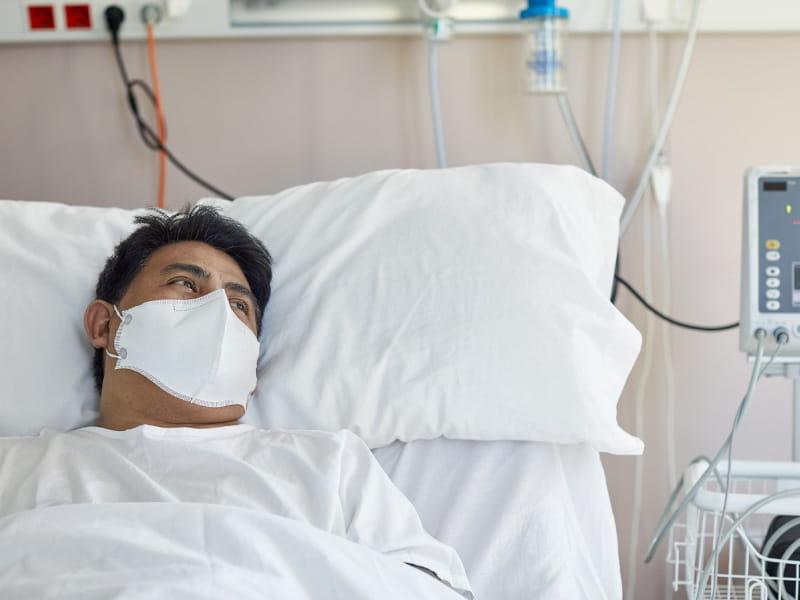COVID-19 may be worse for those with uncontrolled high blood pressure or diabetes
By Emily Rosenbaum, American Heart Association News

People who have uncontrolled high blood pressure or diabetes before getting COVID-19 may be at higher risk of hospitalization or being placed on a ventilator, according to new research that also shows an increased risk of death if diabetes isn't kept in check.
The study of nearly 1.5 million adults in the U.S. with COVID-19 is the largest of its kind, said lead author Dr. Sandra Jackson, a lead health scientist in the Division for Heart Disease and Stroke Prevention at the Centers for Disease Control and Prevention in Atlanta. And unlike other studies, the new research looked at high blood pressure and diabetes control in people before they contracted the coronavirus, rather than using measurements taken during COVID-19 illness.
"These results underscore the importance of chronic disease control to pandemic preparedness," Jackson said.
The study, published Wednesday in the Journal of the American Heart Association, included people who had COVID-19 between March 2020 and February 2022. Overall, 43% of patients had high blood pressure, or hypertension, and 12% had diabetes. Data on control rates was available for most of them.
Compared to participants who had their high blood pressure under the best control, those with the least-controlled high blood pressure had about 30% greater odds of being hospitalized, 30% higher odds of receiving critical care, and 32% greater likelihood of needing a ventilator to help them breathe.
Among participants with diabetes, those with the least controlled A1C – a blood test to monitor blood sugar level – had about 61% greater odds of being hospitalized, 42% greater chance of receiving critical care, 12% higher likelihood of being on a ventilator, and 18% greater odds of death compared to those with the most controlled A1C level.
The researchers adjusted for age, race, smoking status and other factors that could have influenced the results, but they lacked the necessary information about COVID-19 vaccination status.
Adults with hypertension or diabetes can work with their doctors to monitor and effectively treat these conditions, Jackson said. In addition, she said that "to help avoid serious illness from COVID-19, patients with hypertension and diabetes can adhere to vaccine recommendations and can seek early treatment if they do become ill with COVID-19."
The CDC recommends everyone ages 5 and older get the updated COVID-19 vaccine to protect against serious illness from COVID-19.
Dr. Sandeep Das, a cardiologist at UT Southwestern Medical Center in Dallas, said the new study adds to what's known about COVID-19 in the U.S.
"A key strength is that it captures data on a very large number of people prior to hospitalization, thus allowing description of rates of hospitalization, ventilation and mortality, which are uncommon outcomes in the general COVID-infected population," said Das, who was not involved with the study.
"The authors have clearly identified a population of patients with COVID-19 who are at increased risk of worse outcomes, and this information can be valuable in informing public policy," he said. "Although this study didn't directly examine the effects of COVID-19 prevention or early treatment strategies, these are good targets for future investigation."
The COVID-19 pandemic struck a blow to chronic disease management by disrupting health care access and people's daily health routines, leading to fewer ways for adults to obtain preventive health care or engage in behaviors known to promote hypertension and diabetes control, the researchers wrote. In emphasizing the importance of disease management during a pandemic, they recommend telehealth appointments as well as education and support to help people better manage their conditions.
American Heart Association statistics show nearly half of adults in the U.S. – about 122 million – have hypertension, which is defined as a reading of 130 mmHg or higher as the top number (systolic) or 80 mmHg or higher as the bottom number (diastolic). Yet only an estimated 1 in 4 has their high blood pressure under control. Meanwhile, about 29 million adults have been diagnosed with diabetes, and another 9.7 million have diabetes but don't know it. High blood pressure and diabetes each increase the risk for heart disease, stroke and other serious health problems.
This latest research comes as new hospitalizations for COVID-19 increased from 6,479 in early July to 16,766 in early October, according to CDC tracking. Infectious disease experts and scenario models indicate that this fall and winter season is likely to bring a moderate COVID-19 wave similar to last year, but the peak could come earlier compared to previous years.




